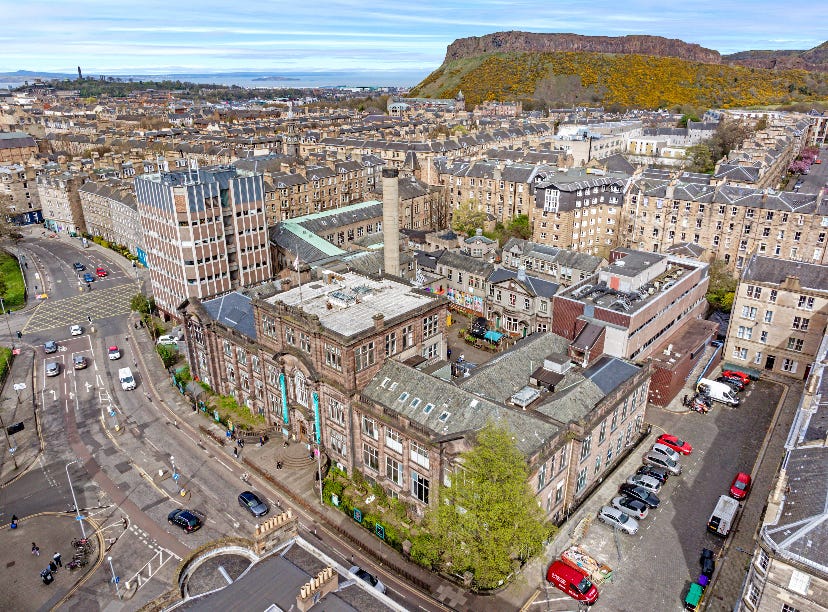Summerhall, a family divided and a £10m challenge
The future of one of Edinburgh's most cherished cultural spaces hangs in the balance

Singer-songwriter Karine Polwart perhaps summed up the dismay best.
“If this becomes student/luxury flats it’ll be an utter travesty in a city that stakes its identity on culture. “One of the most culturally significant spaces/venues in the whole country,” said the serial BBC Radio 2 Folk Awards winner.
Writer and director Mark Cousins - who has described Summerhall as “one of the world’s great arts venues” - gave her a good run for her money.
“When it opened I could hardly believe it. Like a Berlin space in the 80s where Bowie/Eno might have worked,” wrote the ex-Moviedrome presenter and former Edinburgh International Film Festival director.
“It is ramshackle, the opposite of bourgeois cultural places. Wild, messy, Pussy Riot. No venue in my life has made me shape shift more. It gave Edinburgh edge, astringency. A city needs those things. Industrial, medical aesthetic. At its best, daring. We need daring.”
In a little more than 12 years, Summerhall, the sprawling campus overlooking the Meadows, has established itself as one of the city’s most beloved cultural spaces. The higeldy-pigeldy, rabbit warren of former university lecture rooms, offices, courtyards and industrial spaces has achieved something remarkable - made a corner of respectable Newington as edgy as hipster Leith.
And much more than that too. It is believed to be Europe’s biggest privately-owned arts complex. Now a mainstay of the Fringe and Science Festival, it hosts a gloriously eclectic year-round arts programme and a variety of creative businesses, attracting more than a million visitors a year.
Now its future is deeply uncertain. Seeking new investment, the McDowell family, under whose stewardship the thriving Summerhall artistic community has grown, have put the entire site up for sale.
More than just an arts venue
Summerhall hosts a cultural programme that embraces everything from ceilidhs and live music to experimental, multi-media art and performance poetry. Throw in a brewery, distillery, bar and restaurant, cinema, rehearsal spaces and offices largely filled by creative practitioners and you start to get a sense of the breadth of its daily life.
A huge part of Summerhall’s D-I-Y appeal comes from its programming and audiences being as diverse and eclectic as the ragtag collection of buildings which house them. It is proudly inclusive, taking seriously its mission to make the arts accessible to all.
Take, for example, this year’s Fringe programme, which continues as usual, including an interactive baking show, an experimental show about grief, and new comedies from the producers of Fleabag and Baby Reindeer.
On any one night outside of August you might find a community choir rehearsing, a club night in full swing, Pickering’s Gin distillery tours dispersing into the bar or an art house film screening. All the while, a computer programme developer might be working late in one of the site’s warren of offices. It is a slightly anarchic centre of creative endeavour, like a part of the Fringe which stays in Edinburgh all-year round. In a word, it is glorious.
An outpouring of love
The phrase ‘sent shockwaves through the community’ is a terrible cliche, but it is entirely apt here. The sale announcement on Tuesday sparked an immediate outcry from artists and audiences, unrest among Summerhall’s 100-plus tenants and a genuinely remarkable outpouring of love and affection for the venue.
The strength of feeling was clearly demonstrated by more than 10,000 people signing a petition to Preserve Summerhall as a Cultural Hub in Edinburgh within 48 hours, with high-profile supporters including Ian Rankin, Polwart, Cousins and a cast list of political and cultural figures. Artists and supporters are joining forces to discuss a potential bid for a community buy-out.
No one saw it coming. The decision to seek a buyer for the buildings has taken everyone by surprise, despite Summerhall’s deep-seated and well-chronicled financial challenges.
The Summerhall arts village is the vision of its colourful founder and director Robert McDowell. An accomplished artist and economist - whose areas of expertise include, appropriately enough, financial risk - who has sunk millions into the project.
Determinedly low profile, but with a penchant for enigmatic, Eric Cantona-style public statements, McDowell is a man of conviction. A committed internationalist with a passion for experimental art, he flew the EU flag at half mast over Summerhall following the Brexit vote and collaborated over decades with the Fringe doyen Richard Demcaro and German performance artist Joseph Beuys.
McDowell and his family bought the former Dick Vet School and the surrounding buildings through an Isle of Man-based trust, Oesselmann Estate, from the University of Edinburgh for £4 million in 2011.
At the time, it was widely expected the Dick Vet would go the way the nearby Sick Kids hospital site subsequently would, prime real estate sold to housing developers.
What’s gone wrong?
Financial pressures forced a split within the McDowell family.
The vision for the arts village always supposed its cultural activities would be supported by income generated from the wider site.
With more than 100 tenants, including Pickerings Gin, Barney’s Beer and a wide range of successful creative practices, and an annual rental income of more than £1.1 million, the approach had some success.
Such an ambitious project, however, required even greater investment and the pressure was mounting.
Years of standstill public funding for Scottish arts projects is taking its toll on the entire sector, running costs were rising like everywhere else, and a struggle to fill the enormous number of offices on the site dragged on its commercial performance.
A restructure of Summerhall operation in October last year was designed to address the problem. Establishing a charity to support open access to the arts, enabled it to bid for long term funding from national arts agency Creative Scotland, while a separate company ran the day to day business and pursued more income from rest of the campus.
Robert thought they were on the right path, but the rest of the family didn’t agree.
Within six months, Robert was over-ruled by his relatives and the decision was taken to put entire site on the market.
What happens next?
The only certainty appears to be an extended period of uncertainty. The sales process and any subsequent redevelopment plans are likely to take years to fully play out rather than years.
The selling agents Cuthbert White say there has been “extremely wide and varied” interest in the property in the first 48 hours after it was put on the market, with potential buyers from home and abroad making inquiries. It says it is working to find a buyer who will support Summerhall’s continued arts activity on the site and is willing to speak to anyone with a serious interest in buying the property.
Robert McDowell, in one of his trademark unconventional statements, has raised hopes that Summerhall might emerge stronger from the trauma of the sales process.
“When much else in life is uncertain and filled with warring, when the healing balms of the arts are in highest demand, it is troubling for much-loved, dare I say famous, Summerhall to go through the property market wringer!
“Against my personal wishes, a majority of the shareholders voted to put the premises up for sale.
“My hope is that we come through this intact and able to continue as before, perhaps even better? We proved ourselves a valuable part of what makes Edinburgh a great city and fully international. We are honoured that there is so much love and support, let us hope for the best.”
The best hope is perhaps a buyer in the mould of the saviour of Edinburgh Filmhouse, Kevin Doyle. A successful businessman and property developer, his Caledonian Heritable company already owned The Dome, Theatre Royal and Ryan’s Bar when he bought the art house cinema’s former home on Lothian Road for £2.65 million. Instead of seeking to maximise his profits, Doyle, a long-term supporter of the arts, has been content to secure a steady return, knowing he was providing the Filmhouse with the security it needed to relaunch.
There is without doubt space within the Summerhall campus to redevelop - creating, for example, a hotel, homes or student accommodation, all uses which the sellers have indicated are possibilities, subject to planning permission - while retaining all or most of the current arts venues in something like its current form.
It is easy to imagine, for example, a boutique hotel with an on-site distillery, brewery, restaurant and arts venue proving a popular draw.
What about a community buy-out?
The spontaneous outpouring of support for Summerhall suggests there would be huge public support for any effort to stage a community buy-out. A significant hurdle in the way of any bids is the amount of funds it is likely to require.
The McDowell family trust which directed the sale, the Isle of Man-based Oesslemann Estate, has yet to make any public statement. Its selling agents have said they are keen to secure a buyer who will support the continued artistic life of Summerhall.
It is understood, however, to be seeking a price much closer to the site’s market value - in the region of £10 million - than when it was sold by the university.
That would need far more than the ingenuity and dedication of artists and public donations, probably requiring a wealthy backer or backers to have a chance of pulling it off. Anything, of course, is possible.
Labour council leader Cammy Day is to meet Robert McDowell’s team to offer their support to maintaining the artistic life of Summerhall, and Tommy Sheppard, the SNP MP for Edinburgh East, is raising his concerns with the Scottish Government.
Councillor Day said: “We’re monitoring the situation closely and will continue to do so alongside our partners. I’m encouraged to see that this matter will also be raised by the Member for Edinburgh East with the Scottish Government.
“We remain in dialogue with the operators and have an emergency meeting in place to discuss these new developments. We’re committed to preserving and enhancing the Capital’s wider cultural sector going forward and the Summerhall site forms an important part of this.”
The show must go on
In the meantime, Summerhall continues to run its full programme, with tickets on sale for a myriad of shows including for this summer’s Fringe. You can check the programme out here.
Summerhall Arts, the newly-formed charity supporting artists and opportunity for all at the venue, stressed it was business as usual and appealed for support for its work.
A statement for the charity said: “Following the news that Summerhall has been put on the market by the owners, Summerhall Arts are working closely with Summerhall Management - the company that delivers the year-round programme of art and culture in the building - to ensure that prospective buyers will put the best interests of this 13-year-old arts village at the heart of any decision made in the future.
“Until that point, it is business as usual. As a charity that has been set up to support development and the provision of creative opportunities for the artists of Scotland, we are looking for financial support to be able to deliver our ambitious and vital programme.
“During a difficult funding climate for the arts, your donations are more vital than ever, and if you want to truly support Summerhall and Summerhall Arts, please buy tickets for shows and donate to Summerhall Arts' fundraising campaign.”







